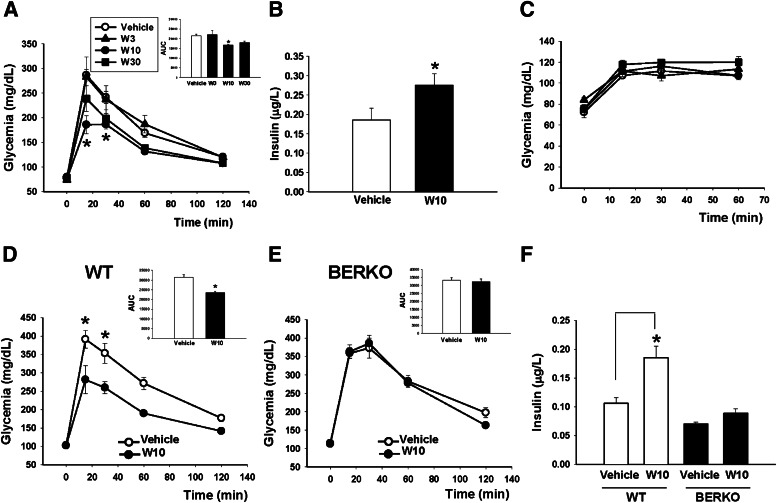FIG. 2.
Single in vivo administration of the ERβ agonist (WAY200070) improved glucose tolerance. A: Fasted C57BL/6 male mice were injected intraperitoneally with a single dose of WAY200070 3 mg/kg (W3), 10 mg/kg (W10), or 30 mg/kg (W30). In parallel, they were administered a glucose challenge (2 g/kg). Through an IGTT we observed an improvement in glucose response in animals treated with the ERβ agonist at W10. Thus, the AUC (inset) was significantly reduced in this group (n = 5). B: In addition, we measured plasma insulin levels 30 min after the administration of the glucose challenge and the ERβ agonist and detected that glucose-stimulated insulin release was significantly higher in W10 mice than in controls (8–10 mice/group). C: In the fasted state, a single injection of WAY200070 did not have an effect on glucose sensitivity (5 mice/group). We confirmed that this finding was an ERβ-mediated effect by using WT and BERKO mice. D: Fasted WT mice were injected intraperitoneally with a single dose of W10 or vehicle in parallel with a glucose challenge of 2 g/kg. A better response to the glucose load was observed in the animals that received the agonist, with a decreased AUC (inset) (5–7 mice/group). E: No changes in glucose tolerance or the AUC were observed in BERKO mice in response to the agonist W10-treated mice compared with the vehicle-treated mice. F: Glucose-stimulated insulin release was clearly enhanced in W10 WT mice but not in W10 BERKO mice (5–7 mice/group). Data are mean ± SE. *P < 0.05 versus vehicle (Student t test). In A and C, statistical analysis between groups was evaluated by one-way ANOVA, with P < 0.05 considered significant. BERKO, ERβ knockout.

